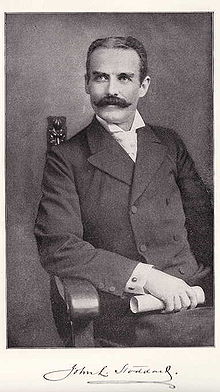(The only Island on Lake Como, the Lake Larius of the Romans)
There sleeps beneath Italian skies
A lovely island rich in fame,
In days of old a longed-for prize,
And bearing still an honored name,-
A spot renowned from age to age,
An ancient Roman heritage;
A valued stronghold, for whose sake
Unnumbered men have fought and died,-
The Malta of the Larian lake,
Forever armed and fortified,
To Como's shores the master-key,
The guardian of its liberty.
Half hidden in a sheltered bay,
Where tiny skiffs at anchor ride,
How different is the scene to-day
Reflected in its waveless tide,
From that which this historic foss
Showed mailed soldiers of the Cross!
Yet still, across the narrow strait,
Some remnants of the hospice stand,
Whose ever hospitable gate
Met pilgrims from the Holy Land,
Its finely carved, millennial tower
Enduring to the present hour.
One gem alone doth Como wear,
None other need adorn her breast;
'Tis this, her emerald solitaire,
Her unique island of the blest,-
The star beside her crescent shore,
A thing of beauty evermore.
On Comacina's peaceful strand
The coldest heart is moved to pray,
As softly steals o'er lake and land
The splendor of departing day,
And scores of snowy peaks aspire
To sparkle with supernal fire.
Then Lario paints for liquid miles
The white-robed monarchs' glittering crowns,
Transmutes at once to dimpled smiles
The sternest of their glacial frowns,
And often holds, with subtlest art,
Some Titan's likeness to her heart.
Fair Comacina, through whose trees
Earth's feathered songsters flit unharmed,
Where soft-eyed cattle graze at ease,
And every whispering breeze seems charmed,
Can it be true that human blood
Hath ever stained thy limpid flood?
Alas! too often, drenched with gore,
Thy cliffs have witnessed deadly strife,
When hostile feet profaned thy shore,
And each advancing step cost life,
As prince and peasant, side by side,
Beat back the Goths' invading tide.
But why disturb the silent past?
Why rouse the island's sleeping ghosts?
Or see in forms by ruins cast
The phantoms of those warlike hosts?
For centuries the gentle waves
Have rolled oblivion o'er their graves.
And what will now thy future be,
Thou pristine refuge of the brave,
Which Rome's last heroes fought to free,
And vainly gave their lives to save?
Forget not, thou wast once a gem
That graced a Caesar's diadem!
Wilt thou fulfil my fondest hopes?
I sometimes long to check the stream
Of tourists hurrying by thy slopes,
And tell them of my cherished dream,-
To see upon thy storied height
A palace worthy of the site;
Not meaningless, not merely vast,
Nor crudely modern in design,
But something suited to thy past,-
For highest art a hallowed shrine,
A classic home of long ago,
The Tusculum of Cicero.
Then roses, rich in sweet perfume,
Shall wreathe with bloom each terraced wall,
And, scattered through the leafy gloom
Of olive-groves and laurels tall,
Shall many a marble nymph and faun
Grow lovelier from the flush of dawn.
So let me dream! I may not see
That stately palace crown thy brow,
Those roses may not bloom for me,
But, as thou art, I love thee now,
Content thy future to resign
To abler portraiture than mine.
Sweet Comacina, fare thee well!
Across the water's placid breast
The music of the vesper-bell
Invites me to my port of rest;
Fair jewel of this inland sea,
May all the gods be good to thee!
Isola Comacina
John L. Stoddard
(1)
Poem topics: alone, beauty, brave, fire, home, life, music, sea, sometimes, star, water, forever, hidden, pray, gentle, oblivion, earth, human, white, crown, Print This Poem , Rhyme Scheme
Submit Spanish Translation
Submit German Translation
Submit French Translation
Write your comment about Isola Comacina poem by John L. Stoddard
Best Poems of John L. Stoddard
